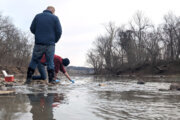When choosing a sunscreen for summer activities, it’s important to remember that a higher SPF doesn’t translate to better protection from the sun’s harmful rays.
Nneka Leiba, director of healthy living science at the Environmental Working Group (EWG), said the SPF value only gives an indication of how the product performs against UVB rays — the ultraviolet rays that produce sunburn.
“But when we’re thinking about sun protection, we need to be protecting ourselves from both UVA and UVB rays, because both of them are associated with skin cancer and skin damage,” Leiba said.
For best results, she recommends using a sunscreen with an SPF between 30 and 50, where protection against both UVA and UVB rays tends to be more balanced.
“And often with the high SPF products, it’s hard to maintain a good balance,” Leiba said.
Researchers have also found that higher SPF products lead to misuse among consumers. Users tend to stay in the sun longer and reapply sunscreen less often, leading to prolonged sun exposure and an increased risk for skin damage.
Selecting a sunscreen with a mid-level SPF is just one recommendation in EWG’s 13th annual Guide to Safer Sunscreens. Here are a few other takeaways from this year’s report:
- Sunscreens with mineral-active ingredients, including zinc oxide and titanium dioxide, are your “best bets” for both safety and efficacy, Leiba said. Non-mineral sunscreens use chemicals to block UV rays, and EWG has found links between some of these chemicals, such as oxybenzone, and undesirable health outcomes.
- Vitamin A is great in a night cream, but researchers at EWG recommend avoiding it in sunscreen. When used on sun-exposed skin, Vitamin A may speed the development of skin lesions.
- Adults can use children’s sunscreen: Sunscreens made for kids and babies often have less fragrance and fewer allergenic ingredients, and Leiba said they’re perfectly safe and effective on adults too.
- Sunscreen is just one tool to help protect the skin from sun damage. Leiba said hats, clothing and avoiding mid-day sun are also important. “Skin cancers are on the rise, so it’s really important to take a holistic look at our relationship with the sun,” she said.






